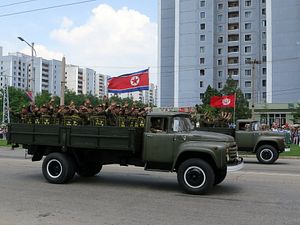North Korea’s nuclear and ballistic missile tests last week put the hermit kingdom squarely at the top of the U.S. national security agenda. They demonstrate that North Korea’s nuclear technology is progressing and that North Korea may soon have the ability to strike U.S. allies—and down the road, the United States—with a nuclear weapon. North Korea’s historic cooperation with Iran and Syria also raises the specter of North Korean nuclear technology proliferating to other U.S. adversaries. Checking this threat is going to require a change in U.S. strategy to embrace a “more, more” approach of both additional economic pressure and expanded diplomatic engagement.
In recent days, diplomats and policymakers have already begun discussing further rounds of sanctions on North Korea. Sanctions enacted in March by both the United States and the United Nations create a strong framework for economic pressure on North Korea, but the unfortunate reality is that enforcement has been inconsistent. For example, trade statistics suggest that while Chinese-North Korean trade dropped sharply after China began implementing new sanctions in April, it may be begging to rebound. There are also anecdotal reports that North Korea continues to use front companies in Hong Kong and China to acquire sensitive technologies for its nuclear and missile programs.
There are a few clear steps that the international community should take to ramp up the economic pressure on the North. Sanctions should eliminate North Korea’s ability to send workers abroad, including to China, Russia, Algeria, Malaysia, and the UAE, given that North Korea’s government effectively treats these workers as slave labor and confiscates an estimated 90 percent of the workers income for its own purposes.
New sanctions should also increase the costs for the countries that allow trade with North Korea continue: For example, the United States and its allies could deliver a message to China and other countries that if they refuse or are unable to stop the flow of sensitive goods into North Korea, Washington will have to begin limiting those countries’ own ability to purchase such goods on international markets. The United States will also need to pressure China over its continuing willingness to send fuel supplies to North Korea, while recognizing that China’s concerns about the potential collapse of North Korea and refugee flows across the Yalu river make this a complicated issue for China.
The U.S., United Nations, and international allies should also offer capacity-building assistance for sanctions enforcement to countries that currently have little capacity to implement sanctions on North Korea. The sanctions enacted in March, for example, direct countries to search North Korean ships, but ports in the developing world don’t always have the capacity to effectively identify North Korean ships or to conduct effective searches. Capacity building can also help countries better identify North Korean front companies and other suspicious activities.
Even as the international community ramps up economic pressure, however, the simple fact is that we need to revitalize our diplomatic approach to North Korea. Our failure to talk to the North Koreans in recent years has clearly failed to check the North’s nuclear program, and one of the key lessons from the Iran sanctions experience is that an economic pressure track must be matched by a diplomatic engagement track. The “P5+1” talks that culminated in last year’s nuclear accord with Iran began in 2006 and suffered through years of fits and starts before beginning to yield progress in 2013. Even when the talks were stalled, however, they provided an opportunity for the United States and its allies to assess Iran’s intentions and make clear what our specific demands were.
Washington and U.S. allies should make an aggressive push to restart the stalled multi-country diplomatic talks with North Korea, and the United States should also make clear that we would be prepared to talk with North Korea on a bilateral basis. While we should insist on discussing North Korea’s nuclear program within the context of any talks, we should also make clear that we will discuss issues of concern to North Korea, such as their long-standing publicly stated interest in a peace treaty to formally end the Korean war. Denuclearization should be non-negotiable, but Washington should be prepared to negotiate at any time and in any place where negotiations can be constructive to advancing U.S. policy.
Sanctions and diplomacy also need to be paired with an forward-leaning military posture to support South Korea, a U.S. ally, and with the kind of aggressive covert operations program the United States reportedly ran in parallel with sanctions to constrict Iran’s nuclear ambitions. But with respect to sanctions and diplomacy, the U.S. should pursue more of both.
Peter Harrell is an Adjunct Senior Fellow at the Center for a New American Security (CNAS).

































